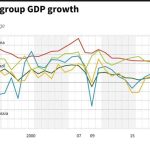Thai Stock Exchange Valuations Compared to Region and World
The Thai stock exchange, or the Stock Exchange of Thailand (SET), is one of the oldest stock exchanges in Southeast Asia. It was founded in 1975 and is headquartered in Bangkok.
The SET is home to over 700 listed companies, with a market capitalization of over $700 billion. The top sectors on the SET are financials, energy, and consumer staples.
The SET’s valuations have been compared to those of other stock exchanges in the region and the world. In general, the SET’s valuations are lower than those of other stock exchanges in the region. For example, the price-to-earnings (P/E) ratio of the SET is around 15, while the P/E ratio of the Singapore Exchange is around 20.

The SET’s valuations are also lower than those of stock exchanges in the world. For example, the P/E ratio of the S&P 500 Index is around 20.
There are a few reasons why the SET’s valuations are lower than those of other stock exchanges. One reason is that the Thai economy is smaller than the economies of other countries in the region. Another reason is that the Thai stock market is less liquid than other stock markets.
Despite the lower valuations, the SET has been growing in recent years. The SET’s market capitalization has grown by over 50% in the past five years.
There are a few factors that could drive the SET’s valuations higher in the future. One factor is the growth of the Thai economy. The Thai economy is expected to grow by around 3% in 2023.
Another factor is the improvement of the corporate governance practices of Thai companies. The Thai government has been working to improve the corporate governance practices of Thai companies. This could make Thai stocks more attractive to foreign investors.
Overall, the SET’s valuations are lower than those of other stock exchanges. However, the SET has been growing in recent years and there are a few factors that could drive the SET’s valuations higher in the future.
Here are some of the factors that could affect the valuation of the Thai stock exchange in the future:
- The growth of the Thai economy: If the Thai economy grows at a faster pace, it could lead to higher valuations for Thai stocks.
- The improvement of corporate governance practices: If Thai companies improve their corporate governance practices, it could make Thai stocks more attractive to foreign investors, which could lead to higher valuations.
- The inflow of foreign investment: If there is an inflow of foreign investment into the Thai stock market, it could lead to higher valuations.
- The performance of other stock markets: If other stock markets perform poorly, it could lead to relative outperformance for the Thai stock market, which could lead to higher valuations.
It is important to note that the valuation of the Thai stock exchange is just one factor to consider when making investment decisions. Other factors, such as the riskiness of the investment and the expected return, should also be considered.
Shayne Heffernan









